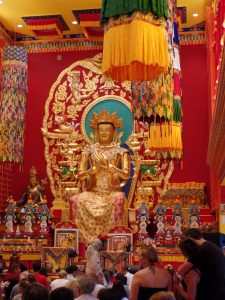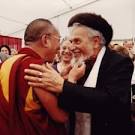A good Jewish boy. It’s an expression I grew up with, sometimes applied to me, often to Jewish men who made it big on the world stage of science, entertainment or sports. It evoked special feelings when we spoke about those who weren’t obviously Jewish, (e.g.: Tony Curtis, Harrison Ford, Peter Coyote). I apply it here, with a taste of Jewish humor, in speaking of the truly good man, Krishna Das. I had the great pleasure to see Krishna Das, (or KD as he likes to be called) just last night as he led a beautiful kirtan, singing Hindu and Buddhist chants at a Tibetan Buddhist temple in Wappinger Falls, NY. And yes, Krishna Das, raised as Jeffrey Kagal, is (or was) Jewish.
I say “is or was” referring to a primary question in my book, Crossing the Boundary, for which I interviewed KD. Does a man or woman born to Jewish parents and raised with Jewish identity continue to be Jewish when they embrace and immerse themselves in an alternate spiritual path? Just where and when does Jewish identity cease to be relevant in describing someone (or oneself)? In writing the book I asked around for people who made that journey, crossed that boundary, knowing that I could not easily tell by names or looks. Starhawk, Sat Santokh Singh Khalsa, Krishna Das don’t sound like typical Jewish names. I wanted to know if these folks still considered themselves Jewish, that that identity still described who or what they are.
Last night, Krishna Das sat beneath a 50 foot golden Buddha statue with surrounding Buddhas and hundreds of Tibetan Tankhas depicting Buddha in his many forms around the temple. He sang chants, which are mostly repetitions of the names of Gods and Goddesses in
the Hindu tradition, and told stories of his time with his guru, Neem Karoli Baba, the Indian saint who continues to be the source of divine guidance for him. The room filled with a sacred glow as people participated in the call and response chanting and sat in meditative stillness or danced to the rhythmic beat of the tabla and bells accompanying KD (who played a droning harmonium). At intervals, KD told stories of his time with his guru and offered teachings about awakening to our essential nature, opening our heart to God/Love, and honoring those great beings from many traditions who continue to guide us on our path.
KD didn’t mention Torah, Moses, Abraham, at least not last night. From what he shared with me in his interview for Crossing the Boundary, it’s not part of his repertoire and not really a significant aspect of his consciousness. Jewishness is the neighborhood he grew up in. He was turned off by the hypocrisy he saw in his own family and community, went through a difficult and rebellious period, and found grace and freedom in far off India, he found a different neighborhood in which to live; he found home. He told me that he has no animosity with his family or the Jewish people, they are a part of the larger human and spiritual family he embraces. He still loves Jewish humor and the Jewish way of talking or shticking, but it just does not define who he is.
As I watched him, I thought of our (his and my) Jewish ancestors. What came to me was the very ancient ones, the mythic wanderers and vision seekers in the wilderness. I felt their presence right there. The Divine One and her/his Angels (Gods and Goddesses) that appeared in fire, sustained the people in the desert, sent messages from the mountain for right conduct in this world, are right in there with Neem Karoli Baba and KD. What more do they ask of us than to wake up and spread the Light and Love of the Divine through the world?
Thank you, KD, kirtan wallah, mensch.


